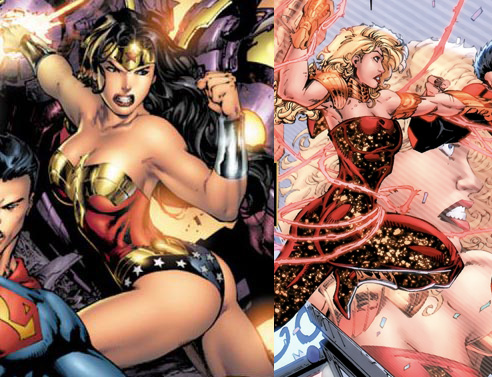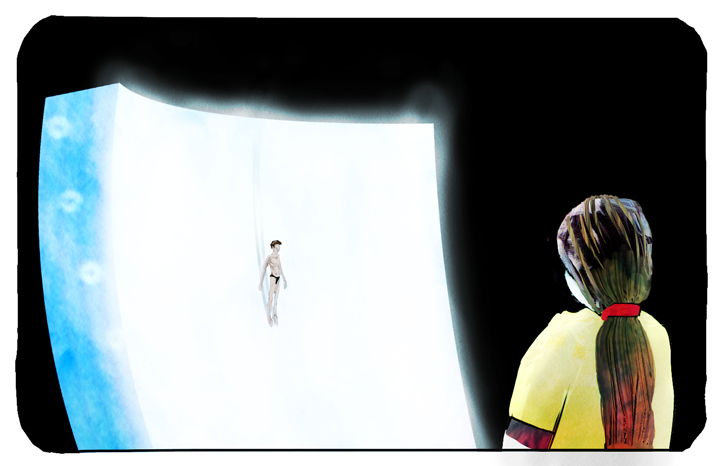Why is Picasso considered to be a great artist?
Because he created a marketplace.
That’s what you really wanted to know, right? Why is he a great artist? Because it used to be that, if you were an artist and you wanted to eat and live indoors, you had to paint stuff like this:

And Picasso came along and said, no, you can still make a living and all you have to do is this:

and do just as well, reach as many people, live just as good a life.
This isn’t a facile thing, and it isn’t a small thing. It is literally genius. When we say “Picasso invented a new way of seeing,” it’s sort of true. But it’s sort of not. He emphasized different bits of seeing than we’re used to. But Picasso’s desire to see and depict multiple angles of something is nothing new. The modern example of the desire to see all angles that we’re probably most familiar with is bad comic book art, where the artist wants to depict the female breast and the female butt at the same time:

That is technically an expression of the same impulse that fueled cubism, though Picasso was interested in more academic things and these artists are interested in boobs and butts.
This is also true of the glossy fancy art of Picasso’s day, by the way, but if I tried to show you one of the zillion naked-nymph paintings that festooned the walls of a hundred years ago you’d be distracted by the quality of the painting and miss the fact that it’s anatomically implausible. We’ll get back to that point in a minute.
The more you learn about art, the more you realize that we’ve all been doing cubism all along, and Picasso just chose to emphasize something interesting about the way we all see. So he didn’t invent a new way of seeing, he picked something unusual about the common experience of seeing that he wanted to explore. But that’s not the most important part of what he did.
The most important thing he did was create a market.
I’ll explain that two ways. The first is abstract, the second is horrifyingly concrete.
Here’s the abstract: a “new way of seeing” is not enough by itself. It must be communicated to the public at large, or it is meaningless. If Picasso had painted the exact same paintings, never showed a soul a single one, and burnt them at his death without ever another eye laid upon them, they would have been robbed of practically all value. It would be as if the pictures were only seen by a dead eye. But he made that essential connection to the species at large, and we all saw it. It is not enough for the eye to see — it must tell the brain. Picasso managed to tell the brain.
Here is the horrifyingly concrete way:
Artists have to eat. Have to. If they don’t, they die. Once they die, they stop painting, they are no longer artists. Art only exists so long as it is fed. Most people don’t realize that about us artists, but it’s true.
Before Picasso, if you wanted to be an artist you had to do it a certain way. Glossy neoclassical characters or brilliant perspective paintings were the only way. Everything must be polished. No others need apply.
Now, that stuff is difficult, true. But the main reason it’s difficult is because it’s time-consuming. Painting an enormous battle scene or a nymph bathing in winter sunlight takes a long, long time.
Artists have been having interesting thoughts like Picasso’s for centuries. But they always had to contain those thoughts within the forests and the nymphs that they absolutely had to paint. You could think all you wanted to about sight and shape, but you had to code it in portraits of rich men and their dogs or you did not get to express it. All your hip new ideas about perspective and point of view have to be translated into the metaphors of genre. This takes a long time. It’s hard work.
Picasso found a way to take this economical, specialized, and abstract form of art and turn it into MONEY. Lots and lots of money. FAST.
He was not just famous — he was one of the people who pioneered the 20th century idea of celebrity.
Not only that, he made it okay to not have to polish things at all! It was like selling the idea of the thing. Something that would have barely been a joke twenty years ago could now be sold for enough to support you and your family for a year.
So now you can do this! We can all do this. We are no longer slaves to Jesus, seascapes, and Roman ruins. Everybody everywhere gets to paint like Picasso now!
Can you imagine the revolution this sparked?
Like Mozart freed the musicians, Picasso freed the artists of the world, and he did it with money and fame.
